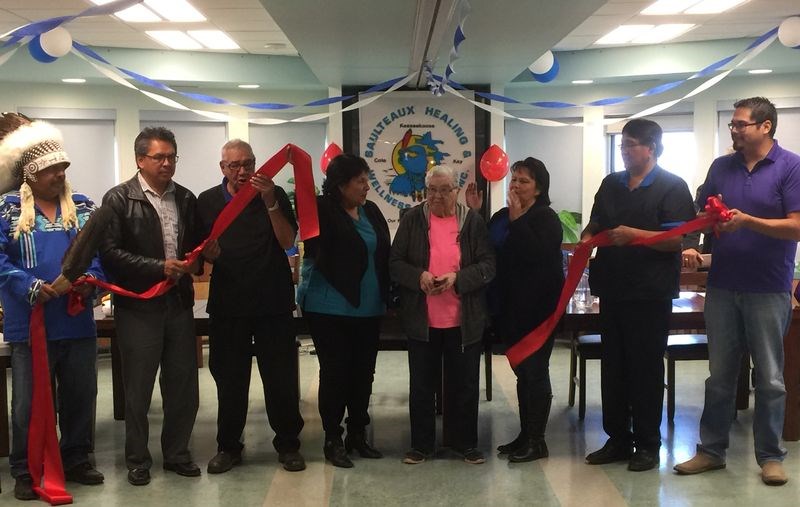A ribbon was cut on September 19 marking the official opening of the Saulteaux Healing and Wellness Treatment Centre at Badgerville on Cote First Nation.
Veronica Cote of Cote First Nation had the privilege of cutting the ribbon in recognition of her late husband Roderick having been instrumental in impressing on the community the need for such a facility and having helped stimulate its organization.
The ribbon was held by Chief Barry McKay of Valley River, Man.; Chief George Cote of Cote First Nation; Elder Langford Whitehawk of Cote First Nation; Yvonne Howse, treatment director of the Centre; Thelma Severight, member of the board of Cote SPAHA (Saulteaux Pelly Agency Health Alliance), Elder Cuthbert Keshane of Keeseekoose First Nation, and Chief Lyndon Musqua of Keeseekoose, a SPAHA board member.
The opening ceremony had begun with the Saulteaux Feather Drum Group performing the Honour Song and Victory Song, said Val Cote, who works in administrative finance for the Centre. Langford Whitehawk said the opening prayer.
Among the speakers were: Chief George Cote, the newly-elected chief of Cote; Chief Lynden Musqua of Keeseekoose; Isabel O’Soup of The Key First Nation, who is the current Yorkton Tribal Council (YTC) tribal chief; Kamsack Mayor Rod Gardner; Bonnie Rushowick of Yorkton, representing Health Canada; James A. Plemel of Regina, representing Saskatchewan Justice; SPAHA board members Fred Quewezance and Thelma Severight; Virgina Musqua of the management committee; Don Rae, chair of Sunrise Health Region board; Raymond Shingoose, representing YTC family services, and Chief Barry McKay of Valley River First Nation.
Also attending the ceremony were four members of the Kamsack RCMP detachment.
The Centre had its beginnings in 2014 when the chiefs of Cote, Keeseekosoe and The Key First Nations, in consultation with FSIN (Federation of Saskatchewan Indian Nations) Senator Ted Quewezance of Keeseekoose, decided to establish a 19-bed treatment lodge, negotiate detoxification beds and review the operations of the Kamsack methadone clinic, according to information from the Centre. A health authority was created and the lodge was opened in March.
The first intake of clients for its six-week program was in May, and the fourth intake will be on September 26, said Val Cote.
At the Centre, detox beds are provided by Sunrise Health Region and major improvements have been made to the methadone clinic, the information said. A health authority medical clinic is being developed and is to be in full operations early next year.
“On behalf of the chiefs, we need to acknowledge the efforts of many people as we hold the grand opening of the Saulteaux Healing and Wellness Treatment Centre,” Ted Quewezance had said, listing the following names: the late Roderick Cote, Mary Langan, Lambert Keshane, Veronica Cote, Clara Munroe, Langford Whitehawk and Cuthbert Keshane.
“For years many of our community members have contributed to making this dreama reality,” Quewezance said. “We all need to acknowledge the leadership of chiefs and councils, who over the years have worked hard on this project.
“We need to thank staff like Sterling Brass, Danny Keshane and Zelda Quewezance for their work,” he said, listing health directors, National Native Alcohol and Drug Abuse Program (NNADAP) workers and front line staff working in addictions.
“The vision of a treatment Centre to address addictions has been a goal of all our members,” he said, acknowledging federal and provincial government staff including the late Bobby McCloskey, “who saw the importance of health to our people,” and members of the steering committee, including Bonny Rushwick and Sandy Tuckuruk of the Sunrise Health Region.
The Centre’s intakes alternate between all female and male groups, and each person who attends follows a seven-step process that begins with a relative who makes a decision that the client wants to change his or her life, the information said. An information package is obtained, an application form is completed and a date to attend is selected. The program is 42 days with an after-care program of at least a year.
Upon acceptance, the client needs to abide by conditions that include a requirement to detox and an arrangement with a worker for transportation. One hundred per cent participation is required. A one-year after-care program is developed.
Each client is expected to be a resource to others with addictions, it said. “You learn, then you teach.” Each client becomes a mentor to an assigned person upon entering the treatment program.
“Our people continue to die at increasing rates and live with an ever increasing burden of disease,” Quewezance said, adding that the Indigenous health system has evolved from colonial ideologies.
“First Nation people are prescribed drugs at a higher rate, put on methadone more often, will have limbs amputated more frequently, are more dissatisfied with health care than others in Canada,” he said. “The Saulteaux Pelly Agency Health Initiative is a direct response to the disparities prescribed in the Truth and Reconciliation Commission Call to Action.
“Our team continues to work to improve access, personal care in a culturally sensitive environment,” he said. The treatment centre, detox beds, changes to the methadone program and a medical clinic are only treating symptoms. Our long term intent is to transform the Indigenous health system. Transformation means an Indigenous health system that provides the right care, at the right time by the right person in the right place.
“Our goal is to have band members treated as people and not statistics waiting to happen.”



